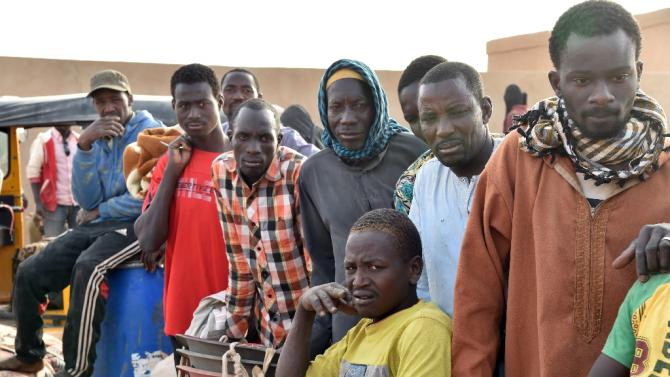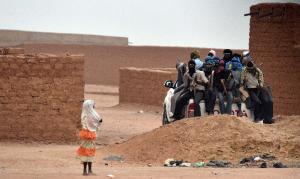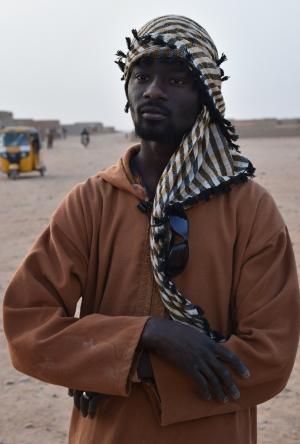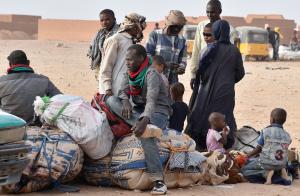Date: Wed, 17 Jun 2015 22:24:27 +0200
Agadez (Niger) (AFP) - In a dusty town on the edge of the Sahara Desert, migrants waiting to be whisked away towards a new life in North Africa or Europe cross paths with others who have returned destitute and devoid of all illusions.
Ousmane Balde has just hopped off a bus from Senegal after a week-long trip through Mali and Burkina Faso to get to Agadez in northern Niger. Once a crossroads on an ancient traders' route, today the town is a hub for illegal migrants.
For Ousmane it is the first leg of a gruelling voyage he hopes will end on the shores of Italy.
The hardest part still lies ahead.
Many of those who went before him died crossing the desert. After that he must navigate war-torn Libya, the staging post for Mediterranean crossings, and then -- most terrifying of all -- survive the sea voyage to Europe in one of the rickety boats that have cost some 1,800 migrants their lives so far this year.
Ousmane says he is counting on God to see him safely across the sea, believing that divine protection guided his older brother on a similar voyage to Spain a few years ago.
"I'm not afraid," the lanky 22-year-old declares.
Ousmane's brother in Spain and another brother living in Libya are picking up the bill for his trip, at a minimum worth 400 euros ($450), according to migrants -- at least 130 euros just to cross the Sahara.
It's fraught with risk, but for many young people in Senegal it's a risk worth taking to escape a life of poverty back home.
"If I don't leave to find work I can't get ahead," Ousmane explains.
- Disillusion -
Ali Idrisu, from Ghana, had also dreamed of getting ahead.
He didn't plan to go as far as Europe, just to Libya, where he hoped to become a star footballer and eventually return home to take up a spot on the Ghanaian national team.
But his grand plans faltered almost as soon as he set out from Agadez a year and a half ago, rammed into a pick-up truck with 24 other migrants.
"We didn't have enough water and food. And they (the people smugglers) used to beat us," he told AFP after arriving back in Agadez from Libya in a dusty jeep.
While the plight of migrants whose boats sink or take in water in the Mediterranean is well documented, a lot less is known about their desert odyssey.
Of the 45,000 illegal immigrants who have landed in Italy this year, 60 percent had travelled through Niger, according to official figures.
Giuseppe Loprete, head of a mission for the International Organization for Migration (IOM) in Niger, said "hundreds" of migrants die each year between the Sahara and Libya -- of thirst, of hunger, in accidents and from abuse.
"What we're seeing in the Mediterranean could be just the tip of the iceberg," he said.
In October 2013, the bodies of 92 migrants were found strewn across the Sahara. They had died of thirst after their smugglers abandoned them in the desert, having promised to take them to Algeria.
"If by chance a migrant falls out of the vehicle the driver doesn't stop, he continues on," Amadou Hamidine Maliki, the IOM's chief in Agadez, told AFP.
If the migrant is lucky, another car might come to the rescue. Otherwise, the person is left alone to wander the desert.
"I've seen people die in the desert," Ali says matter-of-factly.
While the young Ghanian made it to Libya relatively unscathed, Ali's ordeal didn't end there.
His mobile phone and identity documents were stolen shortly after his arrival and he struggled against racism.
"They treat black people like animals," he says.
And while he found a job as a mason, working "24/7, seven days a week", he has nothing to show for his Libyan sojourn more than a year later.
"I never saw a football pitch," he says disconsolately.
As for the football boots he took with him -- a symbol of his broken dreams -- he left them behind in Libya.
"This is all I have left," he says, pointing to his brown boubou robe, grubby after the week-long journey from Tripoli.
Authorities in Niger say they expect some 150,000 migrants to pass through Agadez in 2015, the vast majority headed for Libya, and from there possibly to Europe.
But Maliki said thousands of others have already travelled the opposite direction to Agadez this year -- destitute, suffering from extreme fatigue and often plagued with respiratory problems caused by dust from their journeys.




